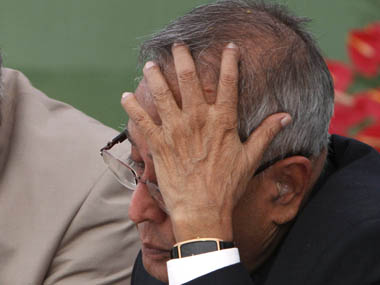With the Congress rout in Uttar Pradesh and Punjab, there’s no doubt the political hold of the already weak UPA has been weakened further. In Uttar Pradesh, the Samajwadi Party is set to form the government without any support from the Congress or the RLD. In Punjab also, the SAD-BJP combine is poised to stay in power.
[caption id=“attachment_236336” align=“alignleft” width=“380” caption=“The election results may not have a direct impact on the budget that Finance Minister Pranab Mukherjee has been working on. Reuters”]  [/caption]
What implications will these election results have on the Union Budget?In theory, state-level election setbacks change nothing at the centre. Butwhat this mini general election has proved is that the Congress is a liability for the UPA. Now, not only Trinamool, but also the Samajwadi, the DMK and other allies will start flexing their muscles.
That’s bad news because a party that is on a losing wicket will not have the guts to take on the bold economic decisions needed to rescue the economy, as this_Firstpost_story notes.
The election results may not have a direct impact on the budget that Finance Minister Pranab Mukherjee has been working on. The focus might remain on fiscal consolidation, reduction of subsidies, and expansion of the service tax ambit, but bold announcements on reforms can be ruled out.
Here’s what could happen to certain elements of the Budget this year and the next:
Curtailing expenditure: Most economists expect the Finance Minister to focus on fiscal consolidation measures, including cutting government expenditure. Yet, as this _Firstpost_ story notes , the chances are now high that the UPA will fast-forward social spending schemes and populism, never mind what they do to the Budget and how they impact inflation.
Call it the UP effect: curtailing expenditure might no longer be the priority it seemed to be before the election results. Attempts will be made to cut expenses, but only at the margin.
Energy reforms: Everyone knows the entire energy sphere - from coal and power to oil and gas - is desperately in need of reforms. However, the UPA’s appetite to introduce any significant measures might be considerably diminished.
Forget about any efforts to align controlled prices with market rates; hiking any price is certain to incur the wrath of some opposition party or the other, or all of them – and the UPA is in no position to resist. In other words, expect the pain of coal, power and oil marketing companies (all of which are state-run) to continue for some time to come.
Oil marketing companies have been dropping hints of raising the price of petrol by as much as Rs 5 per litre. It’s highly likely that to avoid political uproar later, the government might push through the hike in the next few days, exploiting the fact that the political situation is still very fluid.
Cutting subsidies: The resolve of the government is likely to get considerably weaker on this front. Oil and fertiliser subsidies account for a little more than 50 percent of India’s annual subsidy bill, which, in this financial year ending March 2012, is expected to be higher by more than Rs 1 lakh crore, over an above the original estimate of Rs 1.34 lakh crore, mainly on account of higher outlays towards fertilisers, food and oil.
The FM recently said he is “losing sleep” over the skyrocketing subsidy bill. He’s going to have nightmares after the UP vote. Expect some action on this front, but don’t expect any aggressive measures.
Allowing foreign direct investments: The government has been promising investors that some reforms, like allowing foreign direct investment in multi-brand retail, was only a matter of time. Many economists expected the government to announce some kind of timeline on when FDI in retail would be introduced. That seems iffy now.
In a December interview to Bloomberg, Prime Minister Manmohan Singh vowed to pursue FDI in retail after March elections were over. Now, there’s a possibility that it might become an even bigger political fiasco than the first time around - if the government decides to introduce it at all. Mulayam Singh is no friend of multi-brand retail.
Business/agricultural sops: Sops could be aplenty here, with an eye on electoral gains. The sugar industry is already cheering the Samajwadi Party’s victory in Uttar Pradesh.
There might be some sops for businesses too, although don’t count out a hike in excise duties too. At this point, the UPA can’t afford to antagonise any key voter segments. Goodies for consumers might also be packed in-perhaps a hike in the income tax exemption limit this time?


)
)
)
)
)
)
)
)
)



